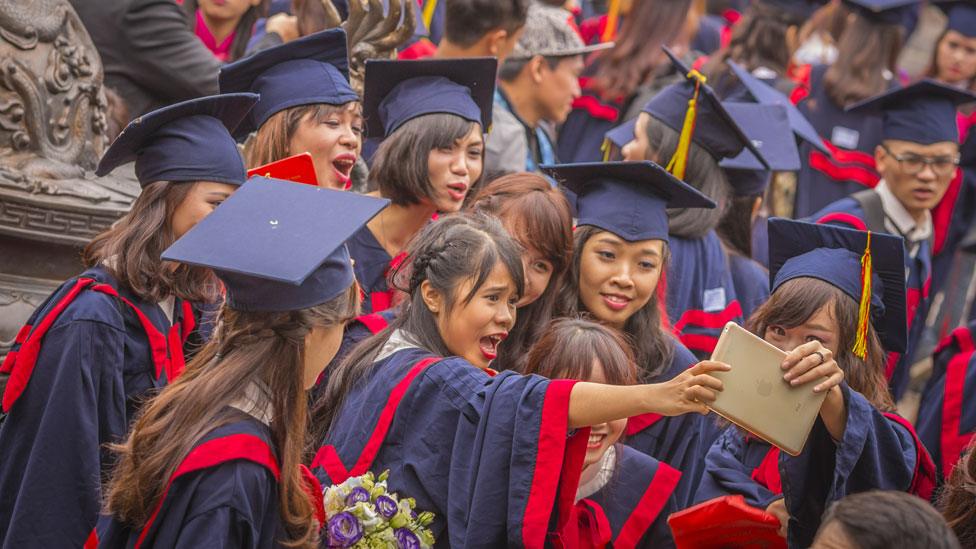10 ways to be the cleverest country
- Published

Conformist cultures might have a head start in education rankings?
When it comes to global education rankings it always seems to be the same story. Asian educational superpowers take all the top places and everyone else goes in for bouts of doubt and recrimination.
For education ministers across most of the world this must be a gloomy time, trying to come up with an upbeat explanation for another round of mid-table mediocrity.
This week Singapore was rated as the best in the world for maths and science - and next week the OECD will publish its PISA test international rankings.
So what does it take to get into the international education winners' enclosure?
1. Move to east Asia: There is no escaping the relentless geography of education rankings. Singapore is now in first place, followed by the likes of South Korea, Hong Kong and Japan. Shanghai has been a previous high flyer - but next week's PISA tests will incorporate the city with other parts of China. Add Taiwan, Macau and Vietnam to this list.
2. I'm only going to say this once... To put it diplomatically, many of the most successful countries have an expectation that people will do what they're told. A focused, conformist culture, a sense of collective purpose, or even an old-fashioned one-party state are often features of the highest achievers. But there are exceptions - the Finns are high achievers with a strong sense of liberal independence.

Vietnam is a classic high achiever: Hungry, ambitious and with centralised control
3. Make sure you don't have natural resources. There's a phenomenon in education called "the resources curse", which shows that economies built on natural wealth - such as sitting on vast oil reserves - tend to underperform in education. Much of the Middle East is given as an example. How do you motivate someone who expects to be wealthy regardless of how well they achieve in exams? In contrast, small countries with few resources have had to learn quickly how to live on their wits. Sixty years ago South Korea had one of the worst levels of illiteracy in the world - now we're all watching their TVs.
4. Bet your house on the teachers. The OECD's education guru Andreas Schleicher has a catchphrase: "No education system can be better than the quality of its teachers". And this week's TIMSS rankings have the same message - success is inseparably linked to the supply of good quality teachers. Whatever headline-grabbing wheezes might be deployed by education ministers, it all comes down to investing in teachers.
5. Be a young-ish nation. These might be ancient cultures, but a curious feature of high education achievers is how many are relative newcomers as nation states or have newly-reconstituted boundaries. Finland will only celebrate its centenary next year. Singapore and South Korea, in their currently political form, are products of the 20th Century. Vietnam, emerging from war in the 1970s, has been one of the most-rapid improvers, racing past the United States and crusty old European dinosaurs. Does it make them more light-footed about changing and adapting?

Oil free: Countries with economies based on natural resources often struggle in education
6. Get a big, overshadowing neighbour. Another surprisingly consistent feature of top countries at education is how many have to compete for daylight with a much bigger neighbour. The European success stories of recent years - Finland, Poland and Estonia - have all had to emerge from the shadow of the old Soviet bloc. South Korea and Hong Kong are up against mainland China. Singapore is a tiny city state surrounded by bigger, more populous neighbours. Education is their way to punch above their weight.
7. It's not a knockout competition. Education league tables are based on the proportion of young people reaching some benchmark of ability. The winners will be those who assume that everyone should cross that finishing line, including the poorest - and that is a distinguishing feature of the top Asian systems. They put the best teachers with the weakest pupils to make sure everyone gets to a basic standard. In contrast, much of the western approach to education is more like the Grand National, with the expectation that very few of the horses starting the race will still be there at the finish. And the rankings reflect this fundamental difference.

Are western education systems built on the assumption that most will not win?
8. Classroom jackdaws. Education systems are hard to disentangle from the politics and the culture in which they've grown. As much as everyone likes to talk about "innovation", there are plenty of pressures against change. But many of the high achieving countries have been ruthless in cherry-picking ideas from other countries and trying them in their own schools.
9. Long-term planning in a short-term world. It might take 10 years before changes in an education system make any positive difference in global rankings. That's not much of an incentive for the fleeting life-span of ministerial office. A recent reforming education minister in Argentina's capital Buenos Aires entered office as the third minister in 12 days. But the big message from global rankings is that what is needed is consistency and continuity.

If all else fails, blame it all on the previous way the education system was run
10. Blame everyone else. Education is a super-tanker that takes many years to turn around. So ministers can take the credit for anything that succeeds and blame everything else on the previous administration. The weathervane of blame always points away from whoever is in charge.
Join the conversation - find us on Facebook, external
